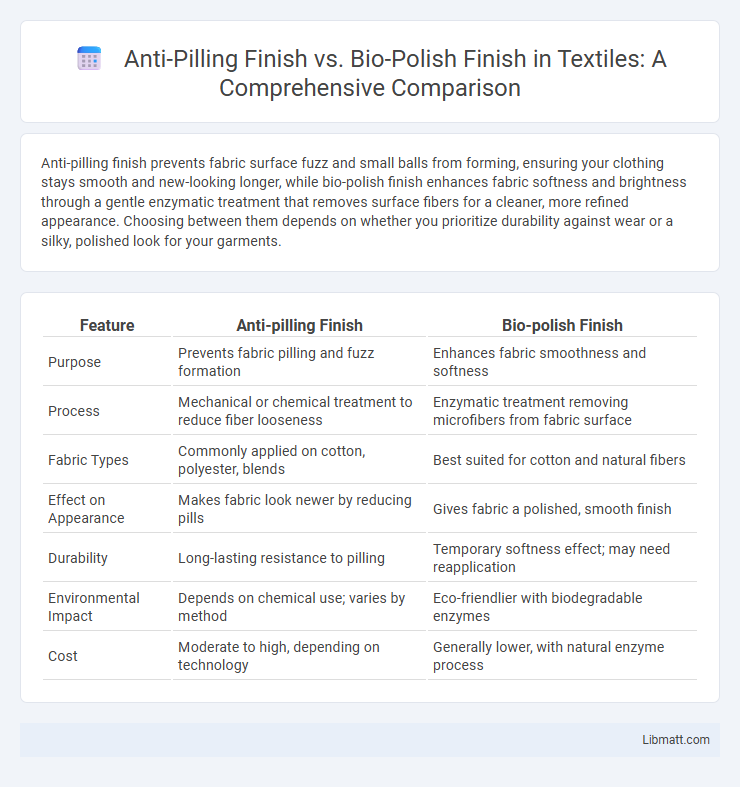Anti-pilling finish prevents fabric surface fuzz and small balls from forming, ensuring your clothing stays smooth and new-looking longer, while bio-polish finish enhances fabric softness and brightness through a gentle enzymatic treatment that removes surface fibers for a cleaner, more refined appearance. Choosing between them depends on whether you prioritize durability against wear or a silky, polished look for your garments.
Table of Comparison
| Feature | Anti-pilling Finish | Bio-polish Finish |
|---|---|---|
| Purpose | Prevents fabric pilling and fuzz formation | Enhances fabric smoothness and softness |
| Process | Mechanical or chemical treatment to reduce fiber looseness | Enzymatic treatment removing microfibers from fabric surface |
| Fabric Types | Commonly applied on cotton, polyester, blends | Best suited for cotton and natural fibers |
| Effect on Appearance | Makes fabric look newer by reducing pills | Gives fabric a polished, smooth finish |
| Durability | Long-lasting resistance to pilling | Temporary softness effect; may need reapplication |
| Environmental Impact | Depends on chemical use; varies by method | Eco-friendlier with biodegradable enzymes |
| Cost | Moderate to high, depending on technology | Generally lower, with natural enzyme process |
Introduction to Fabric Finishes
Anti-pilling finish enhances fabric durability by preventing the formation of small fiber balls, extending the garment's lifespan and maintaining a smooth surface. Bio-polish finish uses natural enzymes to gently remove fuzz and excess fibers, resulting in a soft, polished feel and improved fabric appearance. Choosing the right finish for your textiles can significantly impact both the comfort and longevity of your clothing.
What is Anti-pilling Finish?
Anti-pilling finish is a textile treatment designed to prevent the formation of small fiber balls or "pills" on fabric surfaces, maintaining a smooth and clean appearance after repeated wear and washing. This finish strengthens fabric fibers and reduces friction, prolonging the garment's lifespan and enhancing your clothing's aesthetic quality. Unlike bio-polish finish, which removes protruding fibers for smoothness, anti-pilling focuses on preventing fiber entanglement and fuzz formation.
What is Bio-polish Finish?
Bio-polish finish is a natural fabric treatment that enhances the softness and sheen of textiles by using enzymatic processes to remove surface fuzz and imperfections. Unlike synthetic anti-pilling finishes that create a protective layer to prevent fiber balling, bio-polish finish works by chemically altering the fabric's surface for a smoother, more lustrous look without compromising breathability. Your garments treated with bio-polish finish maintain a fresh, refined appearance while promoting eco-friendly fabric care.
Key Differences Between Anti-pilling and Bio-polish Finishes
Anti-pilling finish primarily prevents fabric fibers from forming small balls or pills on the surface, enhancing durability and maintaining a smooth appearance over time. In contrast, bio-polish finish involves enzymatic treatment that removes surface fuzz and protruding fibers for a softer, cleaner, and more refined texture. Whereas anti-pilling targets longevity and resistance to wear, bio-polish emphasizes fabric softness and aesthetic smoothness.
Benefits of Anti-pilling Finish
Anti-pilling finish enhances fabric durability by preventing the formation of small fiber balls, which helps maintain a smooth and new appearance over time. This treatment improves garment longevity and reduces the need for frequent replacement, saving you money in the long run. Your clothing will benefit from less abrasion and friction damage, ensuring a consistently polished and high-quality look.
Advantages of Bio-polish Finish
Bio-polish finish enhances fabric smoothness and imparts a luxurious sheen by gently removing fuzz and fiber protrusions, which reduces pilling effectively. This treatment also improves fabric softness and appearance while maintaining breathability and durability, making it ideal for high-quality garments. Unlike anti-pilling finishes that rely on chemical coatings, bio-polish finish uses enzymatic action, ensuring a more natural and eco-friendly fabric care process.
Impact on Fabric Durability
Anti-pilling finish enhances fabric durability by preventing the formation of small fiber balls, maintaining a smooth surface and extending the garment's lifespan during regular wear and washing. Bio-polish finish improves fabric texture by removing fuzz and loose fibers, resulting in a soft, polished appearance but with minimal direct impact on long-term durability. Choosing the right finish for your clothing depends on whether preserving fabric strength or achieving a refined look is your priority.
Environmental Considerations
Anti-pilling finishes reduce fabric fuzz and pills through chemical treatments, but some processes involve synthetic resins and surfactants that may impact water systems if not managed properly. Bio-polish finishes use enzymatic treatments derived from natural sources, boasting a lower environmental footprint due to biodegradability and reduced chemical wastewater load. Choosing bio-polish finishes can support Your sustainable textile preferences by minimizing harmful wastewater and promoting eco-friendly production.
Suitability for Different Fabric Types
Anti-pilling finish is ideal for synthetic fabrics like polyester and nylon, preventing fuzz balls and extending garment life. Bio-polish finish excels on natural fibers such as cotton and silk, enhancing softness and sheen by gently removing surface fibers. Your choice depends on fabric type: choose anti-pilling for durability in synthetics, and bio-polish for a smooth, lustrous feel on natural materials.
Choosing the Right Finish for Your Needs
Choosing the right finish depends on fabric type and desired durability; an anti-pilling finish effectively reduces surface fuzz and extends garment lifespan, ideal for knitwear and synthetic blends. Bio-polish finish, also known as enzyme wash, smooths fabric surface by removing fibers, enhancing softness and sheen primarily on cotton and natural fibers. Consider maintenance and texture preferences, as anti-pilling improves resistance to abrasion while bio-polish offers a polished, refined look without compromising breathability.
Anti-pilling Finish vs Bio-polish Finish Infographic

 libmatt.com
libmatt.com